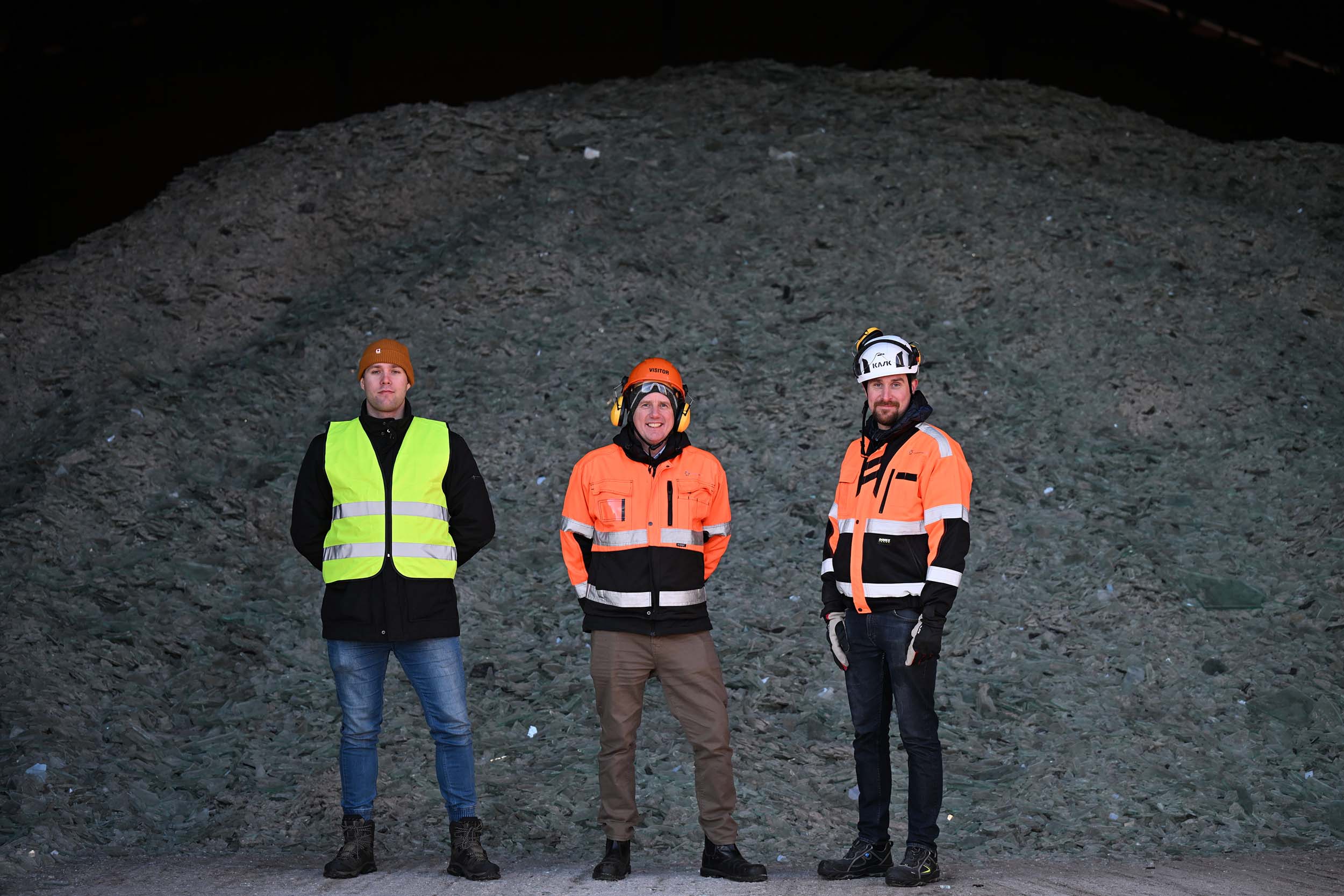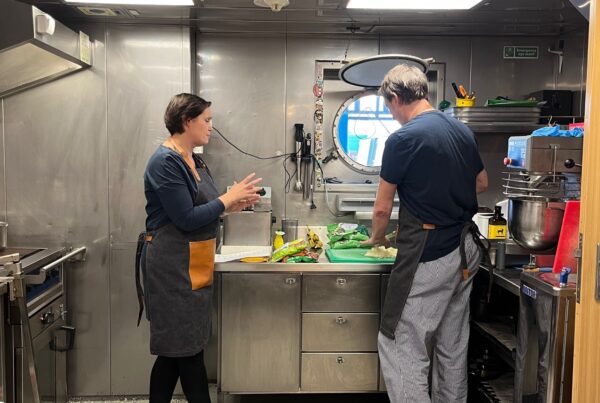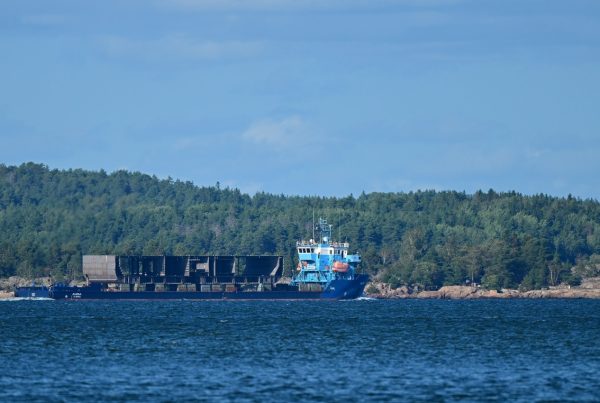Have you ever wondered what happens to a glass bottle or jar after it has been returned to a recycling point? Before its next life as a new product it will most likely end up being processed in Forssa, Southern Finland and then travel (as cullet) to the recycling terminal of VG-Port in Naantali, from where it will continue its journey to Europe in the hold of Meriaura’s ship. We interviewed Ilkka Rekolainen and Henry Rawstorne from Uusioaines Oy, our long-term customer and Finland’s largest processor of recycled glass, about the characteristics of the glass recycling industry.
Uusioaines promotes the circular economy by implementing and developing responsible glass recycling
Uusioaines Oy, founded in 1994, is a pioneer in glass recycling in Finland. It collects and receives waste glass, processes and sells it as raw material for industry as cullet, glass powder and glass fines, and produces Foamit foam glass for infrastructure and the construction industry. The company has approx. 40 employees and its largest owners are Partnera Oyj and Suomen Teollisuussijoitus Oy. Today, Uusioaines is a member of Foamit Group, which also has subsidiaries in Sweden and Norway. Foamit Group’s turnover in 2023 was 43.7 million euros.
The production facilities of Uusioaines are located in Forssa. They receive almost all kinds of glass waste, such as container glass from industry and waste management, as well as from national collection systems operated by Palpa (Suomen Palautuspakkaus Oy) and Rinki (Suomen Pakkauskierrätys Oy). Typical container glass includes deposit glass bottles*, other glass bottles and jars, and glass waste from hospitals. Float glass, such as window glass, comes from glass factories, glass shops, car repair shops and waste management.
Striving for zero waste – all recycled glass will be reused
Category manager Rekolainen is responsible for the glass business at Uusioaines. He says that the production of Foamit foam glass has made the business practically waste-free. Lower-quality recycled glass, which is no longer suitable as a raw material for new glass, is still suitable for the production of foam glass. Foam glass is light and cellular, suitable for insulation and fill material, e.g. in construction and infrastructure. All recycled glass can thus be reused.
Glass as a material can be recycled an unlimited amount of times without its quality or purity deteriorating. In the glass recycling process, sorting means everything. Float glass is treated separately, and container glass is sorted e.g. by color. According to Rekolainen, the material coming from recycling centres varies in quality and purity, so sorting is done in several different processes in the production facilities in Forssa. In the production of new glass, the quality of the raw material is crucial; only a few grams of “defects” or impurities are allowed per ton. Metals and other impurities must be removed. Storing glass outside, where rain and wind may bring impurities, brings its own set of challenges to quality. That’s why the glass of the highest quality is stored inside in the new warehouse of VG-port in Naantali.
Long cooperation with Meriaura
The cooperation between Meriaura and Uusioainens started already in the early 2000s. Over the years, the volumes have grown. A good half of the recycled glass passing through Uusioaines ends up being exported. Since shipping costs are high for a bulk product due to the long sea journey from Finland, the quality must be particularly good. “Finland has a very good reputation in the glass market and the quality of recycled glass is among the best in the world,” says Henry Rawstorne, Account manager in Glass and Foamit export Sales.
Uusioaines appreciates Meriaura’s flexibility and dedicated communication, as well as the good understanding of the glass business developed over the years. An important shipping destination for Uusioaines is Goole in UK, where the ships’ schedules are strictly controlled by the tide. On time delivery is one of the indicators for a carrier’s success. Rawstorne praises the Chartering team of Meriaura and finds it very helpful to have people involved, who themselves have a seafaring background and have therefore personally experienced, for example, the challenges of tides on a narrow estuary.
The cooperation between Meriaura and Uusioaines deepened and diversified in 2023, when also the glass storage and port handling were taken over by VG-Port, a close cooperation partner of Meriaura. A new storage area and warehouse were completed in VG-Port’s premises in Naantali during 2023. Flexible port operations minimize the time ships spend in port. Cost efficiency is also created for the customer now that all parts of the transport chain are in Meriaura’s hands.

Ilkka Rekolainen is Glass Business Category Manager at Uusioaines. Among other things he is responsible for the procurement of the glass. Before Christmas 2023, he was visiting the storage area of cooperation partner VG-Port, where a pile of flat glass was waiting to be loaded into Meriaura’s Aava VG ship.
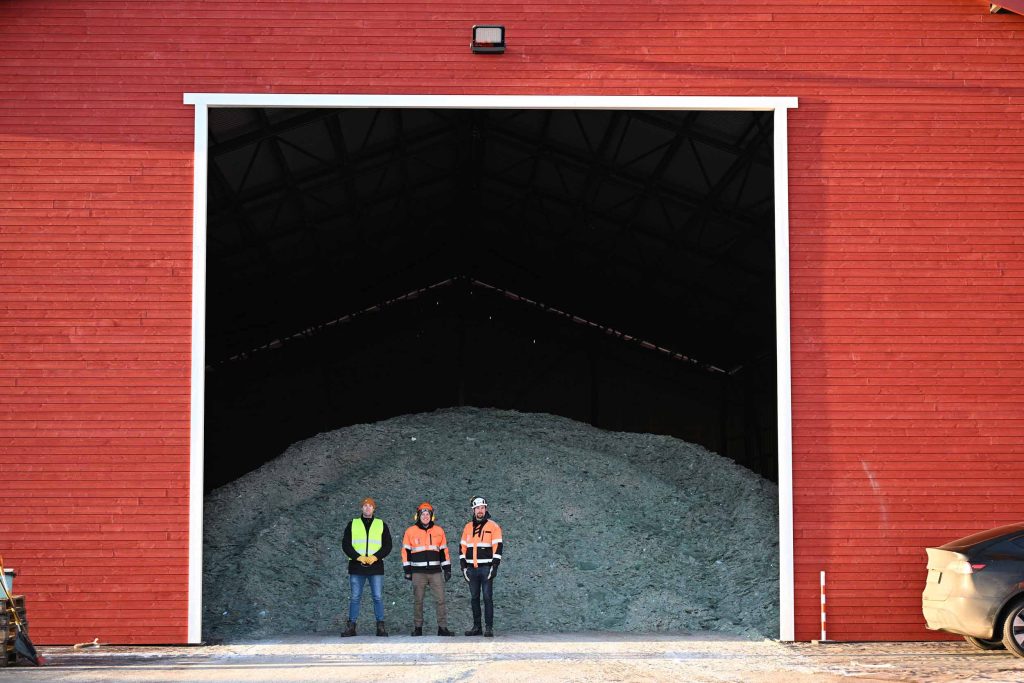 Recycled glass cullet is stored in the new warehouse of VG-port in Luonnonmaa, Naantali.
Recycled glass cullet is stored in the new warehouse of VG-port in Luonnonmaa, Naantali.
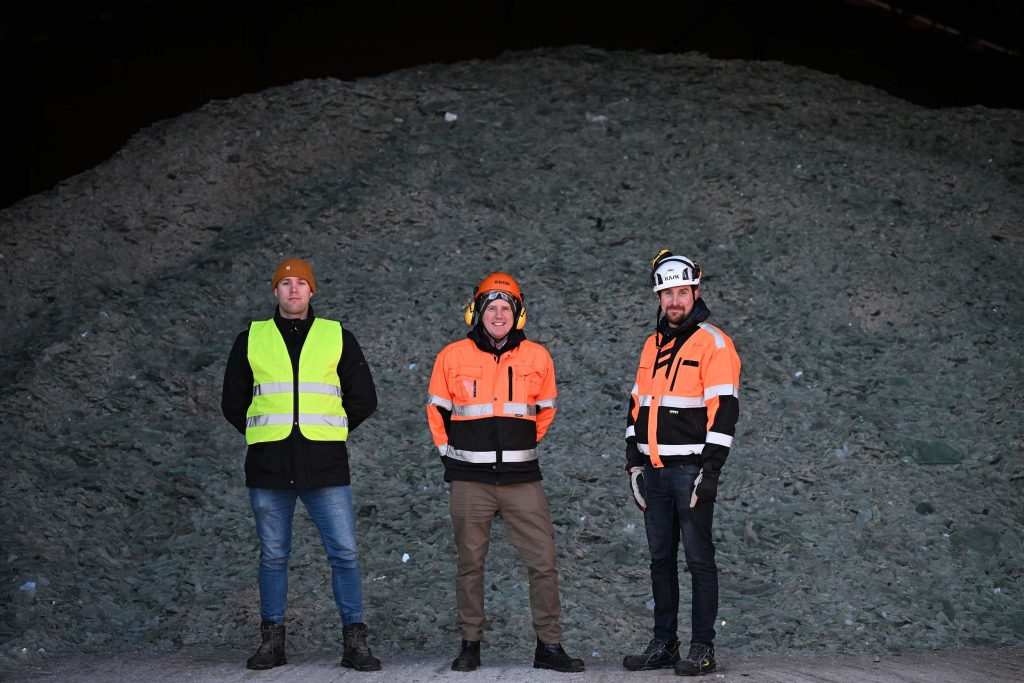 Miikka Löfman, Henry Rawstorne and Ilkka Rekolainen from Uusioaines are checking the quality of the glass before shipping to Great Britain.
Miikka Löfman, Henry Rawstorne and Ilkka Rekolainen from Uusioaines are checking the quality of the glass before shipping to Great Britain.
* Finland uses a deposit-based return system for beverage containers, which enables the efficient collection ofcontainers for recycling. The deposit is a good incentive for recycling. Other aspects, such as the location of the nearest return point and the functionality of the reverse vending machines, affect the will to recycle. Habits and attitudes also have an effect: In Finland, the return of bottles and cans is learned in childhood, and it is considered important. Therefore, the recycling rates of beverage containers in Finland are among the best in the world.
Resources:
Interviews of
Ilkka Rekolainen, Glass Business Category Manager
Henry Rawstorne, Account manager, Glass and Foamit export Sales
Sustainability report of Foamit Group 2022


